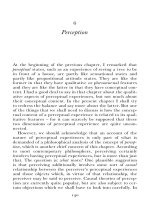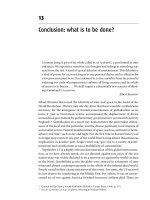Words That Appear to Be Misspellings of
Bạn đang xem bản rút gọn của tài liệu. Xem và tải ngay bản đầy đủ của tài liệu tại đây (93.54 KB, 10 trang )
I
t’s good to have modern computers around that can scan thou-
sands of lines of text in a jiffy and provide quick fixes with their
handy find-and-replace feature. I heard there was a story in a news-
paper that talked about the dramatic turnaround of a business. It
had been deeply in debt earlier but now it was “running in the
African American.”
While these electronic beasts are useful to keep our wayward
fingers in check and take care of sundry typos that creep in, they are
no substitute for humans. Here are a few words that defeat the
spell-checker. You could use them to your advantage: to defeat
your opponents in a game of Scrabble. These words appear to be
misspellings of common words but they are fully accredited,
licensed, certificated words from a standard dictionary—as official
as any word can be in the English language.
passible (PAS-uh-buhl)
adjective Capable of feeling, especially pain or suffering; suscepti-
ble to sensation.
18
CHAPTER 4
Words That Appear
to Be Misspellings
of Everyday Words I
cmp01.qxd 7/21/05 12:12 PM Page 18
From Middle English, from Middle Latin passibilis,from Latin
passus, past participle of pati (to suffer).
● “Only the most sensitive of seats in the thinnest of pants worn
by the most passible of owners will detect differing harmonies
of the Accords.”
—Los Angeles Times
monestrous (mon-ES-truhs)
adjective Of or related to mammals that experience one estrus (rut
or period of heat) in a breeding season.
Combining form mon- (one) from Greek monos, mono- + oistros
(gadfly, madness).
● “The ova vaccine, Miller says, is a better choice for monestrous
species, like coyotes, that come into heat only once a year,
regardless of whether the female conceives.”
—Discover
cloture (KLO-chuhr)
noun The action of closing a debate by calling for an immediate
vote.
verb tr. To close a debate by cloture.
From French clôture (closure), eventually from Latin claustrum
(barrier).
WORDS THAT APPEAR TO BE MISSPELLINGS OF EVERYDAY WORDS I
19
The great high of winning Wimbledon lasts for about a week.
You go down in the record book, but you don’t have anything tangible
to hold on to. But having a baby—there isn’t any comparison.
—
C
HRIS
E
VERT
, tennis player (1954–)
Unsurpassable
If there could be a poster child for the word passible, it has to
be the princess in Hans Christian Anderson’s 1835 story “The
Princess and the Pea.” The princess was black and blue all over
her body because there was a pea under the twenty mattresses
and twenty feather beds upon which she slept one night.
cmp01.qxd 7/21/05 12:12 PM Page 19
● “A senator can challenge legislation by staging a filibuster, a
maneuver to block action on an item by controlling the Senate
floor for an unlimited time. A filibuster can be ended through
legislative agreement,or by invoking cloture, which requires 60
votes. The Senate is evenly split, with 50 Republicans and 50
Democrats.”
—New York Times
nutriment (NOO-truh-ment, NYOO-)
noun A substance that provides nourishment; food.
From Middle English, eventually from Latin nutrimentum,from
nutrire (to nourish).
● “In order for oral consumption—or the lack thereof—to
become our God, nutriment itself must reach a transcendent
status. So here’s the latest gastrosophical gospel: Food is no
longer food. Food is a drug.”
—Harper’s Magazine
assoil (uh-SOIL)
verb tr. 1. To pardon. 2. To atone for.
From Middle English, from Old French, from Latin absolvere (to
absolve).
● Jonah
“I sank my teeth into the salt ground.
There was no cry. Only later,
when the city put on sackcloth
and starved its cattle, I heard something—
a hiss of pity rising from the dry,
ungathered grain. An assoiling sound.”
—Barbara J. Orton, Fairleigh Dickinson Literary Review
20
ANOTHER WORD A DAY
Tr y to learn something about everything and everything about something.
—T
HOMAS
H
ENRY
H
UXLEY
, biologist (1825–1895)
cmp01.qxd 7/21/05 12:12 PM Page 20
A
rchaisms are grizzled old words that have continued to do
their job despite their age, as you can see in the examples.
They are old-fashioned but serviceable, and that’s the reason they
are still making the rounds. They serve a purpose: to give an aura
of an earlier period, and evoke a sense of historical setting, in nov-
els, religious writing, poetry, ads, and so on. What’s old for one is
young for another, so there’s no consensus on which words are
archaic.
clepe (kleep), past participle cleped/clept or ycleped/yclept
(i-KLEPT)
verb tr. To call or name.
From Middle English clepen,from Old English cleopican,from clipian
(to speak or call).
● “Sir, do not dare you clepe me in such a fashion or I shall be
compelled to thrash you with a puncheon or clevis, whichever
being the most geographically convenient!”
—Austin American Statesman
21
CHAPTER 5
Archaic Words
cmp01.qxd 7/21/05 12:12 PM Page 21
sennight (SEN-yt)
noun A week.
From Middle English, from Old English seofon nihta,from seofon
(seven) + nihta, plural of niht (night).
A cousin of this word is “fortnight.”Twice as long as a sennight,
it’s a compressed form of “fourteen night.”
● “Midweek of May’s third sennight has passed and there remains
only a fortnight before the blowing of the June roses.”
—New York Times
anon (uh-NON)
adverb 1. At another time. 2. Soon. 3. At once; immediately
(archaic).
From Middle English, from Old English on an (in one).
● “Anon, King Hamlet discovers his brother’s perfidy. Threatened
with banishment, poverty, and disgrace, Claudius poisons the
king, promptly marries Gertrude, and assumes the Danish
crown.”
—The Economist
22
ANOTHER WORD A DAY
The absence of evidence is not evidence of absence.
—
C
ARL
S
AGAN
, astronomer and author (1934–1996)
Hasta Mañana
These three possibilities for the word anon pretty well cover
the spectrum from now until never—the Mexicans use
mañana for an indefinite commitment—I guess if my wife
asks me to do something I can reply “anon” and have it all
covered.
—George Pajari,West Vancouver, Canada
cmp01.qxd 7/21/05 12:12 PM Page 22









